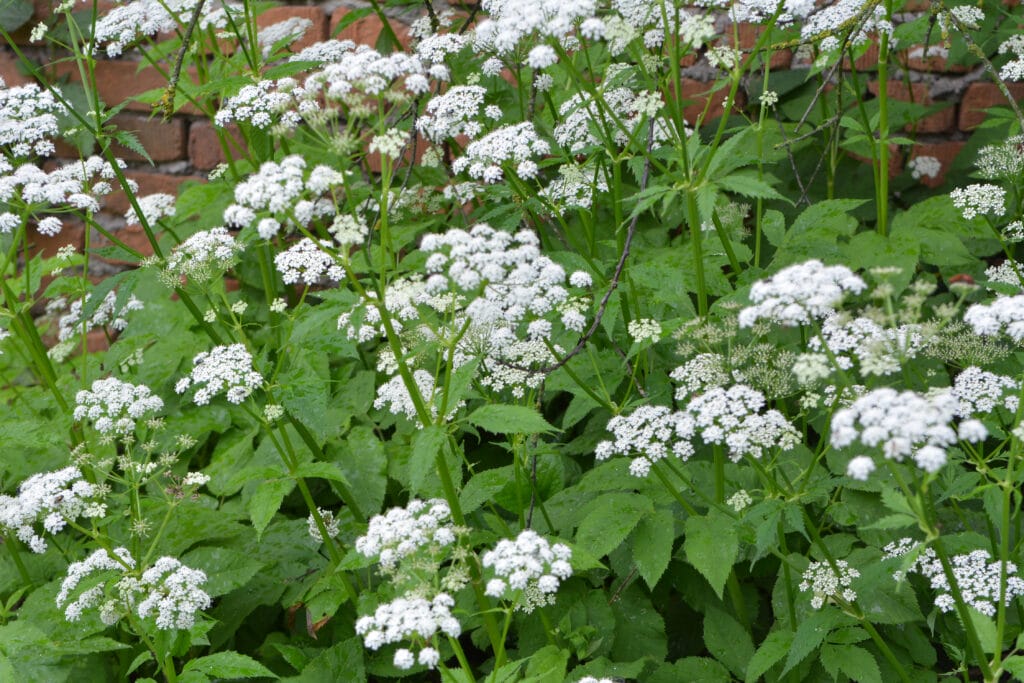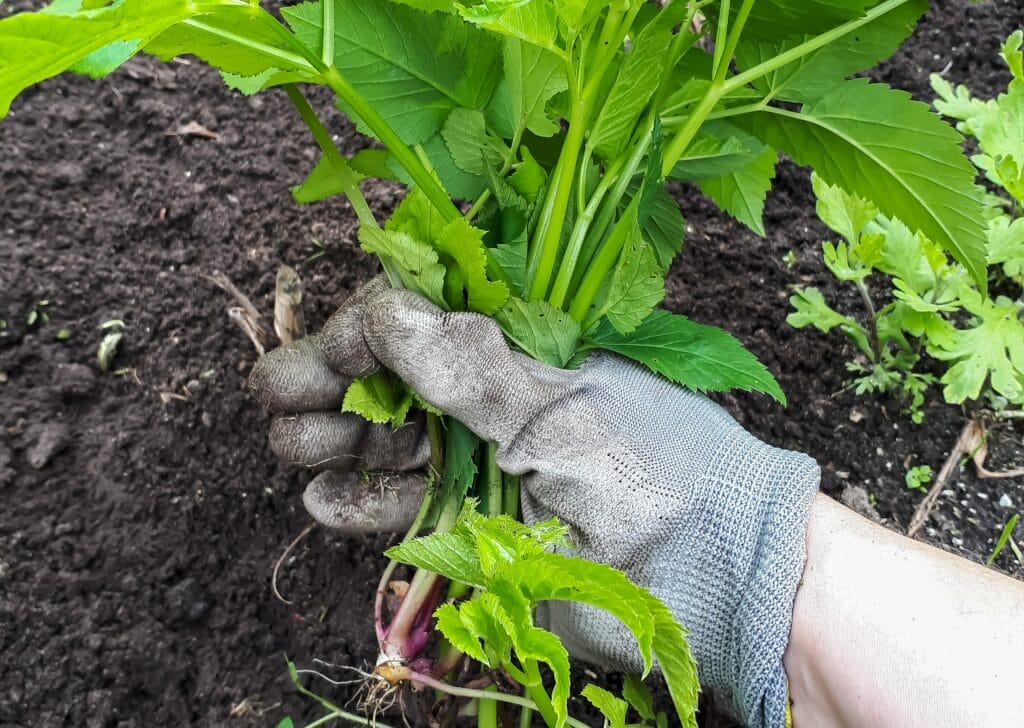Ground elder (Aegopodium podagraria), is native to Europe and Asia but has become widespread in many other parts of the world. Often considered invasive, although not officially listed as such in the UK, it has the aggressive ability to quickly spread and dominate an area. Due to this pervasive nature, the plant named goutweed in other parts of the world, has left many gardeners pondering, how do I get rid of ground elder? Removing what’s considered by many a weed, can be a very labour intensive task. This has lead to experimentation of alternative methods of killing ground elder, using vinegar or boiling water. So, what works?
What is ground elder?
Ground elder is a member of the Apiaceae family, that typically grows to a height of about 50-100 cm and has smooth, hairless leaves. These often have with a ‘toothed’ edge, and are what is known as ‘compound’, being split into three roughly triangular leaflets. The plant is found in a wide range of habitats, including woodlands, meadows, and disturbed areas. Ground elder tends to thrive in moist and shaded locations but will also tolerate sunnier conditions. Ground elder flowers in late spring to early summer, producing umbels of very small white flowers. Identification of ground elder can be a challenge, as it does have a number of lookalikes.
One of the main challenges with ground elder is its invasive ability to spread rapidly through an extensive network of rhizomes (underground stems). It is regarded by many as a native plant (it was introduced into Britain by the Romans), and so it doesn’t appear on any lists of concern, such as Schedule 9 of the Wildlife and Countryside Act 1981. Even so, this perennial weed is a source of frustration. Controlling ground elder can be difficult because even small fragments of its rhizomes left in the soil can lead to new plant growth, making killing it very difficult.
Is ground elder a weed?
The debate around the definition of weeds will probably rumble on forever. However, those involved in gardening or grounds maintenance typically believe that ground elder is a weed. It might not make everyone’s top ten annoying plants, but ground elder is up there with bindweed, dandelions, bramble and ivy as a source of frustration in the garden.

Common ground elder (Aegopodium podagraria) growing beside a wall as a weed iStock/Orest Lyzhechka
Will vinegar kill ground elder?
When applied directly to the leaves of plants, vinegar desiccates and can kill the foliage. However, when looking alternative treatments, it’s important to understand the plant in question before selecting the control method. Annual plants tend to have small, shallow roots. Perennial plants, however, have developed many strategies to stay alive through the winter, one being rhizomes. These are stems that are modified to live in the soil and are multipurpose, both storing nutrients and a means by which the plant spreads.
While vinegar can play a part in a more natural approach to weed control, it’s not a complete solution for invasive and deep-rooted weeds like ground elder. The problem is that the vinegar will be absorbed by the ground elder rhizomes. Whilst you may damage or kill the visible stems and leaves with vinegar, you won’t kill the plant, even with repeated applications. Integrated methods, including physical removal of the plants and rhizomes, mulching, and possibly other more targeted herbicides, might be necessary for more effective control.
Even when using a systemic herbicide, this may result in a quick kill when treating an annual weed, but may not with rhizomatous perennials. These respond much more slowly, and may need repeat applications to gain full control, especially if they are well-established.
Will boiling water kill ground elder?
In consideration of other ‘natural’ methods, it’s worth noting another commonly posed question, will boiling water kill ground elder? Whilst boiling water is capable of killing ground elder stems, as it percolates through the soil it will quickly lose heat, becoming less and less effective. You may damage or kill some of the shallowest rhizomes but, deeper down, the ground elder rhizomes will remain intact. It is likely that enough viable root will remain to push out new growth.
Remember, your garden soil is a living thing environment, a bio-diverse store of nutrients and home to beneficial micro-organisms and mini beasts. Pouring boiling water onto garden soil is likely to kill off many of these hidden assets, reducing the health of your topsoil in the process.
How to kill ground elder
Controlling ground elder growth may be challenging, but it is possible. If you are wondering how to kill ground elder then you need to get serious. As we’ve discovered, the ground elder rhizome system makes it tricky to kill in one go, but the summary below will help you decide which are the best methods for your situation.
Manual removal
This is labour-intensive but effective if it’s done thoroughly. Manual removal involves carefully digging over the soil to locate and extract the ground elder rhizomes and roots.
- Be prepared to dig deep and to spend time sifting, raking and examining each spadeful.
- Remove every bit of rhizome you spot to help prevent regrowth.
- Regularly monitor the area and promptly remove any new shoots or roots that emerge.

Manual removal of ground elder from a vegetable bed iStock/Kristine Radkovska
Mulching
Apply a thick layer of organic mulch, such as wood chips or straw, to smother ground elder plants and deprive them of sunlight. Mulching can help suppress the growth of new shoots and make it more difficult for the plant to regenerate.
Repeated cutting and/or mowing
Regularly cutting down or mowing the above-ground foliage will weaken the plant. However, this won’t eliminate the rhizomes, just deplete the ground elder’s energy reserves, making it less vigorous over time.
Persistentance is required with this control method, a one-off cut or mow won’t do the job!
Herbicides
Systemic herbicides can be very effective in controlling ground elder if applied correctly and at the right times.
- Refer to HSE guidance to ensure the proper safe use of herbicides and to understand your obligations when using this method.
- Apply herbicides during the active growing season when the plant is transporting nutrients to the rhizomes.
- Repeat applications may be needed, as some rhizomes may escape initial treatment, but do so according to label instructions.
In practice, it’s very common for a combination of methods to be the most effective at getting rid of ground elder. An important part of the process involves monitoring and promptly addressing any new growth to prevent re-establishment. Be very cautious with herbicides, and always follow the manufacturer’s instructions to ensure safe and effective application.
If you use pesticides in your garden, allotment, or on houseplants you are legally responsible for using them correctly and effectively. You must keep your garden and allotment safe for people, pets and wildlife.
How to get rid of ground elder naturally
We’ve covered the more rigorous approaches to ground elder removal, but there are some gentler approaches to the problem, and one worth considering is the use of planting to help you control ground elder.
As ground elder isn’t a particularly tall plant, especially before it flowers, using other ground cover plants will help to provide competition, preventing it from taking over entirely.
You could consider planting mint varieties, false forget-me-not (Brunnera macrophylla), bugleweed (Ajuga), periwinkle (Vinca minor), foamflower (Tiarella), or hardy geraniums. A very damp spot could be ideal for a cluster of ferns, many of which will outgrow the ground elder. Alternatively, how about trying a stand of shade-tolerant raspberries or alpine strawberries, keeping the ground elder in check while providing you with some delicious and heathy summer and autumn berries. Some low-growing woody shrubs, which can cope with shade, will be happy enough surrounded by ground elder and provide competition.
Of course, all vigorous plants need to be monitored, so if you decide to go down this route, make sure you choose plant varieties that you will be able to manage. There’s no point keeping the ground elder at bay, only to be swamped by another invader!
If you are concerned about common ground elder, or have exhausted methods using vinegar or boiling water, call 0203 174 2187 or 01202 816134 to talk to one of our consultants today.
Lead image iStock/Yaraslau Saulevich

